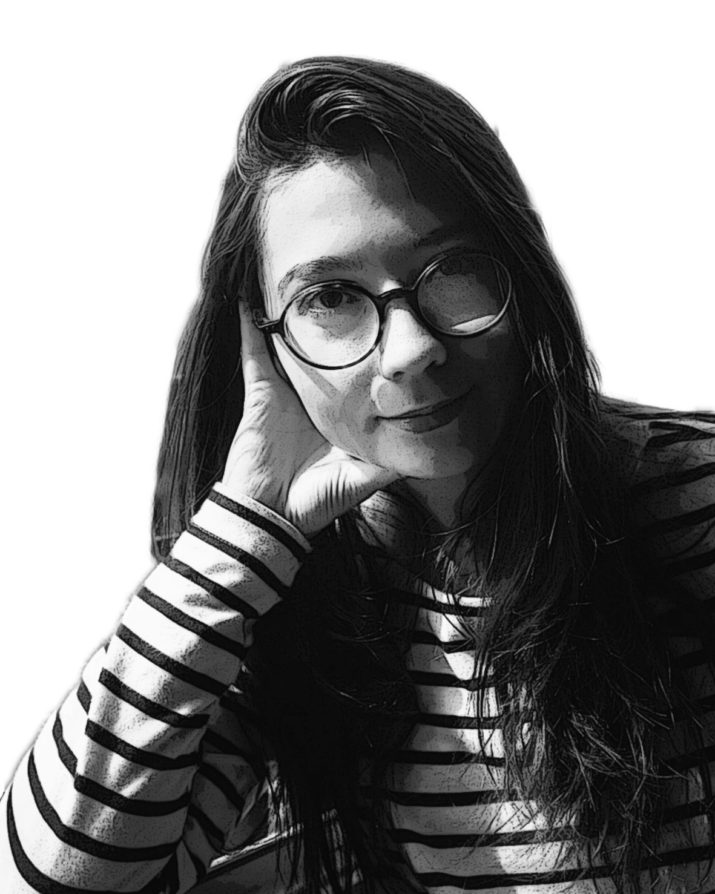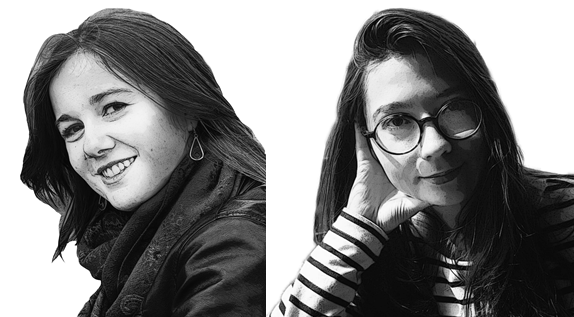

Translated from the French by Erika Luckert.
This is part of our special feature on Women, Gender & Sexuality.
I hear talk of an Anna Bellmer (why this masked reference to Hans Bellmer?), female voices praising her as the most beautiful woman in the world, in the universe, I ask, but where have you all seen her? And so with an air of resignation they show me the sky, a cluster of violet and silver dominants: Anna Bellmer is a celestial body. Is she a goddess, I dare to murmur. No, they answer sharply, she’s a woman.
Integrations
“I’d like to have a penis.” A desire that the little girl didn’t express until several years later, before abandoning it. She didn’t speak of it to her parents, nor to anyone, but her ceiling that watched her wake each morning—her bedroom as a whole—served as her silent accomplice, hence a perfect one, in her persistent desire. For this desire confessed itself most often at night; as soon as she sank into the shapes of the grown men who were the protagonists of her dreams, she, the little girl, felt like an adult male. This sensation, the transformation, was never entirely physical, she saw it in her mind: to be a man must be better. She admitted it to herself tacitly when her aunt—at the time without children and saddened by the fact—went into ecstasies on the telephone just hearing “the voice of a little girl,” a voice which the little girl then forced deeper.
In her bedroom, where nobody would intrude, she imagined herself powerful, penis in hand, victor over all the rest and defying humiliation. Her first sexual fantasy, from which she had her first orgasm (she spent some indeterminate measure of time trying to return to that afternoon in her bedroom, and even if, later on in her sexual development, she found its intensity again, she never quite recaptured its amplitude, or never believed that she had), that first fantasy featured a man in his position of triumph. She was the man. She imagined herself penetrating women, and imagined her pleasure, because it wouldn’t be she who was penetrated. It was a weakness, an open wound that asked for nothing but to be opened again, a readiness—that’s what she was with her hole. And somehow she sardonically enjoyed identifying herself with that hole: I am a hole. I am available, unfailingly open to all the world that enters by that orifice, and it was a stigma shaping her whole body, the features of her face, her long hair, her silhouette, even those invisible and unexpected things like the hormones of which for a long time she knew nothing.
Hidden in the hallway of the apartment and rubbing her clitoris against the carpet through her jeans, she would listen to her mother climax. Sometimes she heard the man moan, and it was as if she’d witnessed something obscene, something surprising that shattered the triumph of man over woman, for whoever made the other come was the victor, not the one who came, that’s what the movies always showed, where invariably the woman would cry out, while the man remained silent as if entirely in control, even of his ecstasy.
That first fantasy around age eleven, the one that made her orgasm on her mother’s bed in the living room took the form of a man who locked up women
in his cellar, but not to torture them, unless by the pleasure he gave them. He would spend hours attending to his chosen one, making the torment of foreplay last until she admitted that, despite the situation she found herself in, she desired him. And then the triumph of the man and the tender, sickly sweet pride with which he penetrated her.
The avatars of herself multiplied, as is so common for a child, with some recurring more often than others. She was perfectly satisfied to be a little girl by day (even though she forced herself to adopt a deeper voice), and to dream of herself as a grown man at night. Perhaps this was nothing more than the sort of apprenticeship common among certain heterosexuals—to dream of the other, to strive to understand it—or perhaps it was a deeper confusion of gender or sexual identity that persisted, for even though she was always content in a woman’s form, content to present herself as a woman in the world, her desires took off in all directions.
Even as sexual delineations appeared permeable to her at a young age, she dreamed of destructured spaces.
She would stretch out on her bedroom carpet (she would never lose that habit of sitting on the floor, which she had always considered to be just as good as the restrained dignity that the artefact of the chair imparts), whether or not she had vacuumed as her mother had asked her to, or she would stretch out on her bed, or on her mother’s bed when she wasn’t there, and she would look up at the ceiling, until it seemed she had embarked on an expedition to an inverted world, a world founded on the ceiling and not the floor. She would imagine her legs moving between the light fixture and the doorframe (sometimes she even raised them into the air and pretended to walk on the ceiling), she would imagine that this was the real world, where people walked a naked earth with strange elements on the ground, something almost absurd, but it could be beautiful to live in that nakedness, if only the ceiling were the base beneath our feet. A world as if purified. Staring at the ceiling, she dreamed of needing nothing. Of living like this, in an environment where nothing would explain the strange order of things, where it was as if all the world’s people were fictional beings. It was someone other—not her—who walked on the ceiling and stepped over the doorframe and the remains of toppled walls. It was someone other who bore the phallus and took pleasure in penetrating women, in penetrating the world.
She dreamed that she had lost her sense of touch. What would the world be if we could no longer touch it? What would it look like? A blank white universe, insensate, like the infinite black space seen in the sky.
An obsession: to guard against the world, to guard against its people.
She dreamed of a woman alone on a bridge: suddenly, she finds herself surrounded by men, all soberly dressed in elegant black suits and white shirts—they pile eggs in each of her hands, confounding her with this gesture, she doesn’t know what to do with these eggs, she is afraid of dropping them, but at the same time, they aren’t hers, or else they are hers—is she supposed to let them fall?—and now the men are gone and she is once more alone on the bridge with these few eggs that seem a great many to her, sending her into a panic.
Because she too has eggs within her, she is repulsed by the dreams of this friend who, each night, admires or imagines a gestation—but how is it possible to feel as female as that, even if the gestation is symbolic, even if the gestation is the metaphor for a project—she is repulsed by that total biological identification (and still, she wished for a child). This horror of being only a womb: to be male was to be a mind, because men have monopolized so much, and since everything she read was so masculine in its origins, to be male meant liberty.
Later, the beauty of women would take hold of her in countless places—on the street, in the metro—desire for their soft skin naked to the air, for their silky hair, she wanted to touch the people she saw, the men too, the ones with good hair, the ones with smooth skin, men with fine physiques, and their clothes, all the things that were part of them and that they wore, the men and the women both. And Emmanuelle, sweet Emmanuelle, who was the object of her daydreams, who made her thirst, just centimeters away, to caress the skin of her arms, to know the texture of her slightly plump skin, moist, skin that could only be soft, the invigorating warmth of her flesh gilded in that moment by a ray of sun (and that little square of skin like a stained-glass window), her breasts that she didn’t dare look at too long, the single strand of hair on her forehead that flustered her long eyelashes, chestnut brown over chestnut brown, her mouth often slightly open, bright with moisture (always a promise), so many details she would have liked to come to know, and struggling violently, she said to herself, “I am the Wolf.” I am the wolf, and she is the lamb. Guilty.
In Turkey, her eyes could embrace the landscape, skimming over hill and valley in turn—she imagined herself caressing them, holding softly in the palm of her hand the enormity of valleys whose sensuality suddenly overwhelmed her with their sense of the female sex: nature isn’t entirely other, then, nor is it entirely the same—it is similar, resembling, contiguous.
This wasn’t the experience of Tournier’s Robinson Crusoe who inseminated the earth by literally making love to it—to Nature feminized like a fertile womb; it was, beyond the formal analogy, beyond the libidinous impulse, the intuition of a nature that is not, after all, an other.
And she watches her friend (her platonic friend) with fascination, watches her move, laugh, speak, dance, gesture, simply exist, and when she strokes her hair, the girl’s warm head on her lap, she runs her hand through that slightly coarse, half-shaven, half-long hair, an intimate caress, and she feels in her groin that almost-pain of arousal, as a warm pleasure comes to wet her underwear.
Intimate connections of things, despite some salient ruptures in between. Not that universal, shared vibration that she never really felt, living as she did free from mystical urges, but rather this sensation of being some remainder, which is not to say counter-human; quite the contrary.
Erika Luckert is a writer from Edmonton, Canada, and a winner of the 92Y/Boston Review Discovery Prize. She holds an MFA in Poetry from Columbia University, and her work has has appeared or is forthcoming in Denver Quarterly, The Indiana Review, CALYX, Room Magazine, Measure, Atticus Review, The Boston Review, and others. Erika lives in New York City, where she teaches creative and critical writing.
Cristalle Tourrenc is a writer and editor from the region of Paris, in France. She holds two masters in literature & arts and in creative writing, and is currently acquiring a master in publishing while working in a publishing house. She is working on a poetic novel.
Photo: Erika Luckert | Private
Photo: Cristalle Tourrenc Le Tréguilly | Alexis Rosier
Published on July 5, 2017




